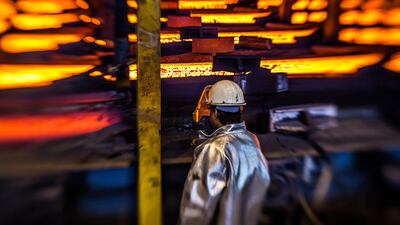Government support will be the main driver of manufacturing and industrial development in the UAE and Saudi Arabia over the coming decades.
That is the overwhelming conclusion of a survey of business people in the region by market research firm Borderless Access for The National, with 96 per cent and 98 per cent agreeing or strongly agreeing that promotion of industrial clusters by government will be key in Saudi Arabia and the UAE, respectively.
“The growth map for industrialisation of the region is well charted out,” said Dushyant Gupta of Borderless Access. “The clear sectoral focus by the government for industrial development combined with corresponding implementation measures builds strong confidence in the business community.”
The development of manufacturing in the region as well as global trends will be the topics of the first Global Manufacturing and Industrialisation Summit (GMIS) to be held this week at the Paris-Sorbonne Abu Dhabi campus on Al Reem Island.
The summit has been more than two years in the works and is a joint effort of the UAE Government and the United Nations Industrial Development Organisation (Unido).
It comes at a time when international trade and industrialisation is under threat from a populist backlash, which has played on fears that globalisation and technological advances have destroyed jobs, especially in the older economies of the West.
The three-day programme, which starts on Tuesday, will bring together top government and non-government organisation officials, such as David Shark, deputy director general of the World Trade Organization, and Bernard Charlès, chief executive of Dassault Systemes and a leading proponent of 3D manufacturing, to address how the rapidly changing manufacturing universe can provide jobs and opportunity in an economically and environmentally sustainable way.
The UAE Government is also expected to lay out its latest strategy through 2020, focusing on how larger state-backed industries – such as the aluminium, steel and petrochemicals sectors – can link with small and medium-sized companies to foster organic growth.
“We see the GMIS as a great platform and a perfect opportunity to set out that road map,” according to Ayman Al Makkawy, the director general of Abu Dhabi’s Industrial Development Bureau at the Department of Economic Development. Ahead of the event, the UAE and its partners have done a series of international roadshows in cities across the US, Europe and Asia, which included promoting the benefits of economic free zones in the country, such as Khalifa Industrial Zone Abu Dhabi.
The summit is expected to attract about 1,200 participants and the agenda is organised and facilitated by The Economist Group, which will cover industries including food and beverage, automotive and pharmaceuticals, as well as key issues of protectionism and the emerging Asian economies.
Industrial development is a key plank of economic policy in the UAE and Saudi Arabia.
Abu Dhabi last year set a target to double the size of its industrial base to 10 per cent of GDP, part of a broader strategy to increase the non-oil private sector’s share of GDP from 27 per cent to 40 per cent by 2030.
Outside the hydrocarbon-based industries and, to some extent metals, the region has lagged in terms of industrialisation. Manufacturing accounts for about US$15 trillion globally – out of a total global economy of about $73tn, according to World Bank estimates – with a share of only about $300 billion for the GCC countries.
amcauley@thenational.ae
Follow The National's Business section on Twitter

